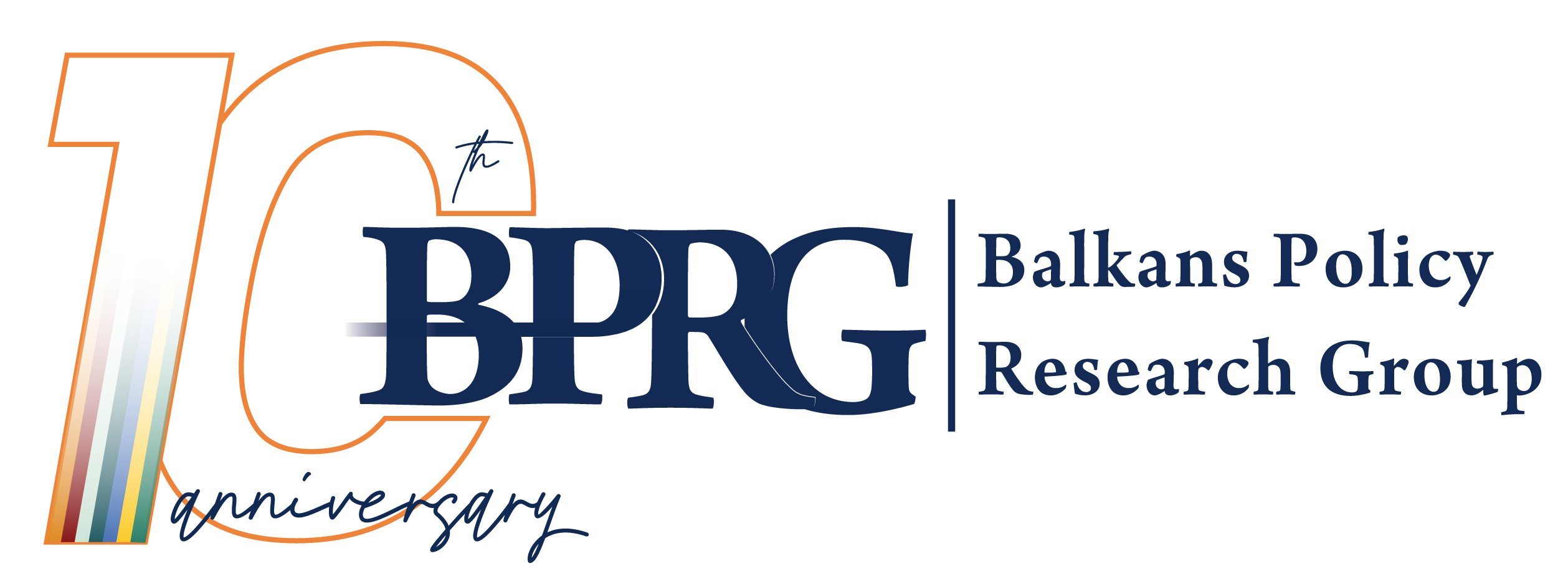I.
The largest music festival in the Balkans and one of the largest in Europe, Exit, is organized annually at Petrovaradin Fortress in Novi Sad, Serbia. Last year, the festival gathered around 300,000 participants with performers such as Wiz Khalifa, The Prodigy, Ellie Goulding, and David Guetta. Attendants came from 60 countries around the world, including without any doubt many young people from Kosovo, who by an extraordinary coincidence were issued a paper known as “Entry-Exit” after crossing any of the border crossing points with Serbia. This document was agreed by Pristina and Belgrade within the Freedom of Movement Agreement in 2011. Kosovo citizens crossing the border must have their ID card on them, and are also issued this document, valid for three months, at the point of entry. Ironically, this is also a pre-entry ticket for the Exit festival.
It is interesting that with the ID and this “letter”, citizens of Kosovo can also fly from Belgrade and Nis airports. Obviously, they also need to have with them the passport and a visa for third countries, although the authorities in Serbia do not ask for this.
As complicated as it sounds, this is much better than in 2011 or even before the Freedom of Movement Agreement, when entry or crossing into Serbia was allowed only with former Yugoslav documents, which were possessed only by a few citizens of Kosovo, and that only in the first years after the war. Consequently, the number of Kosovo citizens who benefited from this agreement is very high. It has contributed to easing the lives of citizens and provided some kind of “normalization”, which was the aim of the dialogue, as stated in the UN Resolution that establishes the foundation of this process.
We must add economic benefit here, since using Serbia as a country of transit to other European destinations shortened the distance and reduced travel costs. For example, for a trip from Kosovo (Prishtina) to Germany (Berlin) via Serbia, the distance is 1747 kilometres, while through Albania the distance is 2075 and through Croatia-Montenegro the distance is 2168 kilometres. So, approximately 650 km less, fewer fuel costs, fewer accommodation costs in hotels and for tolls, and even aeroplane tickets.
Given the large diaspora of Kosovo, the cost per year reaches millions. According to official Kosovo Police statistics for 2011 (before the Agreement) around 650 thousand entry-exits of the diaspora were registered at Kosovo’s borders with Serbia. By 2016 that number went up to over 1.5 million, or 230%. An increase of over 200% has also been registered in the number of crossings of residents from Kosovo to Serbia, while in 2015 this number reached almost 4 million citizens’ entries-exits between Kosovo and Serbia.
Another segment of this deal is the vehicle border-crossing. Kosovo drivers’ licenses, as well as insurance policies, are now recognized in Serbia. KS license plates are allowed, unlike RKS, which need to be replaced with temporary license plates.
Given that Pristina continued to issue KS license plates, this allowed easiness especially for many Serbian citizens living in Kosovo; according to a recent survey published by NGO Active, 87.20% of Kosovo Serb respondents have Kosovo personal documents. This enabled normalization, while it was known that the earlier situation in this area was chaotic. Cars without license plates and uninsured cars were used, many which unfortunately continue to circulate in northern municipalities of Kosovo.
II.
Citizens expect to see all Western Balkan countries moving towards the European Union. Then, there will be no border crossings, no customs. People, cars and goods will pass without being stopped while crossing from one country to another. There will be plenty of those going to Exit from Kosovo, and as many people will come from Serbia to Dokufest in Prizren. Until then, both governments must work harder and more sincerely commit to normalizing and “Europeanizing” relations. After all, security, employment and freedom of movement are very important for citizens of all our countries.
It is up to the European Union, despite internal challenges, to accelerate the accession process for all countries in the region. In the case of Kosovo and Serbia, implementation of the agreements reached in the technical dialogue needs to be enhanced. Therefore, parties should sit at the table and agree on advancing the implementation of reached agreements, such as the agreement on regional cooperation or even the one on mutual recognition of university degrees, but also on reaching new agreements, which would enable full normalization of relations between the two societies.
This article has been produced with the financial assistance of the European Union. The contents of this publication are the sole responsibility of Kosovo-Serbia Policy Advocacy Group and can in no way be taken to reflect the views of the European Union.
Najveći muzički festival na Balkanu, i jedan od najvećih u Evropi, pod nazivom Exit, se svake godine održava na Petrovaradinskoj tvrđavi u Novom Sadu, u Srbiji. Prošle godine je festival okupio oko 300.000 učesnika, a nastupili su izvođači kao što su Wiz Khalifa, The Prodigy, Ellie Goulding, David Guetta i drugi. Učesnici su bili iz oko 60 zemalja sveta, a nesumnjivo i mnogo mladih ljudi sa Kosova, kojima je neviđenom slučajnošću prilikom prelaska graničnog prelaza sa Srbijom izdat papir poznat kao Entry-Exit. Ovaj dokument je preveden kao „ulaz-izlaz“, a o kojem su se Priština i Beograd dogovorili u okviru Sporazuma o slobodi kretanja iz 2011. Kosovski građani koji prelaze granicu sa Srbijom moraju sa sobom da imaju ličnu kartu, kao i da im se izda ovaj dokument, koji se izdaje prilikom ulaska i važi na tri meseca. Ironično, ovo je pred-ulaznica i za festival Exit.
Interesantno je da uz ličnu kartu i ovaj „papir“ kosovski građani mogu i da lete sa aerodroma u Beogradu i Nišu. Očigledno je da pri sebi trebaju da imaju i pasoš i vizu za treće zemlje, iako vlasti u Srbiji to ne traže.
Koliko god zvučalo komplikovano, ovo je mnogo bolje nego što je bilo pre 2011. ili pre Sporazum o slobodni kretanja, pri čemu je ulazak ili tranzit kroz Srbiju bio dozvoljen samo sa dokumentima bivše Jugoslavije koje je posedovao veoma mali broj kosovskih građana i to samo u prvim godinama posle rata. Kao rezultat toga, broj kosovskih građana koji su imali koristi od ovog sporazuma je veoma veliki. Ovo je doprinelo olakšavanju života građana i svojevrsnoj „normalizaciji“, zbog koje se je i odvijao dijalog, kao što poziva Rezolucija UN-a, odakle i potiče ovaj proces.
Dodajmo ovde i ekonomsku korist jer je korišćenje Srbije kao tranzitne zemlje do drugih evropskih odredišta smanjilo udaljenost i smanjilo troškove putovanja. Na primer, za putovanje sa Kosova (Prištine) u Nemačku (Berlin) preko Srbije, udaljenost je 1747 kilometara, dok je kroz Albaniju 2075, a kroz Hrvatsku i Crnu Goru udaljenost je 2168 kilometara. Dakle, oko 650 km manje, manji troškovi goriva, manje troškova za hotelski smeštaj i putarine ili čak i avionske karte.
Imajući u vidu veliku dijasporu Kosova, iznos ovih troškova na godišnjem nivou se meri u milionima. Prema zvaničnim statistikama Policije Kosova, u 2011. (pre sporazuma) je zabeleženo oko 650 hiljada ulaza-izlaza dijaspore na granici sa Srbijom. U 2016. taj se broj popeo na preko 1,5 miliona ili 230%. Takođe, prema ovim podacima, zabeleženo je i povećanje od preko 200% u broju prelazaka građana sa Kosova u Srbiju, a u 2015. taj broj je dostigao skoro 4 miliona ulazaka-izlazaka građana između Kosova i Srbije.
Drugi segment ovog sporazuma je prelazak automobilima. Vozačke dozvole Kosova, kao i polise osiguranja, su sada priznate u Srbiji. Dozvoljene su čak i KS tablice, za razliku od RKS, koje je potrebno zameniti probnim tablicama.
U međuvremenu, Kosovo i Srbija su postigli dodatni sporazum, poznat kao „Sporazum o nalepnicama“, ali isti nikada nije sproveden. U slučaju implementacije ovo bi omogućilo prolazak svakog vozila, samo što bi vlasti obe zemlje prekrivale simbole jedna druge na tablicama, postupak koji je mnogo jednostavniji od probnih tablica. Bilo bi dobro da se u sprovođenju navedenog Kosovo i Srbija slože oko „nalepnica“ i time bi se eliminisalo svako eventualno zaustavljanje na granici.
S obzirom da je Priština nastavila da koristi KS tablice ovo je stvorilo olakšice, posebno za mnoge srpske građane koji žive na Kosovu; prema nedavno objavljenom istraživanju NVO-a Aktiv 87,20% ispitanika iz srpske zajednice na Kosovu je preuzelo lična dokumenta Kosova. Ovo je omogućilo normalizaciju kada se zna da je situacija u ovoj oblasti ranije bila haotična. Korišćena su vozila bez tablica i osiguranja, a veliki broj istih nažalost i dalje saobraća po severnim opštinama Kosova.
Očekivanja građana su da sve zemlje Zapadnog Balkana napreduju ka Evropskoj uniji. Onda više neće biti graničnih prelaza, a ni carina. Ljudi, automobili i roba će prolaziti bez zaustavljanja prilikom prelaska iz jedne zemlje u drugu. Biće puno onih koji će ići na Exit sa Kosova, a isto toliko će dolaziti iz Srbije na Dokufest u Prizrenu. Do tada, obe vlade moraju da ulože više napora i iskrenije se angažuju na normalizaciji i „evropeizaciji“ odnosa. Na kraju krajeva, sigurnost, zaposlenje i sloboda kretanja su veoma važni za građane svih naših zemalja.
Evropskoj uniji ostaje, uprkos unutrašnjim izazovima, da ponudi ubrzanje procesa učlanjenja za sve zemlje u regionu. U slučaju Kosova i Srbije, potrebno je ubrzanje primene sporazuma postignutih u tehničkom dijalogu. Strane bi stoga trebale da sednu za stolom i dogovore se o napredovanju u primeni postignutih sporazuma, poput sporazuma o regionalnoj saradnji ili čak o uzajamnom priznavanju univerzitetskih diploma, kao i o postizanju novih sporazuma koji bi omogućili potpunu normalizaciju odnosa između dva društva.
Ovaj članak je izveden uz finansijsku pomoć Evropske unije. Sadržaj ove publikacije isklјučiva je odgovornost Grupe za zagovaranje javnih politika Kosova i Srbije i ni na koji način se ne može smatrati da odražava stavove Evropske unije.



